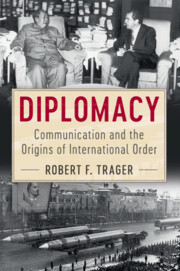Book contents
- Frontmatter
- Dedication
- Contents
- List of Figures
- List of Tables
- Preface
- 1 Can Adversaries Communicate?
- 2 How Perceptions of Intentions Form
- PART I THEORY
- PART II EMPIRICAL ANALYSIS
- 7 The Fruit of 1912 Diplomacy
- 8 How Germany Weighed British Resolve in 1938–1939
- 9 Statistical Analysis of Diplomatic Communication
- 10 Creating International Orders
- APPENDICES
- References
- Index
10 - Creating International Orders
from PART II - EMPIRICAL ANALYSIS
Published online by Cambridge University Press: 25 October 2017
- Frontmatter
- Dedication
- Contents
- List of Figures
- List of Tables
- Preface
- 1 Can Adversaries Communicate?
- 2 How Perceptions of Intentions Form
- PART I THEORY
- PART II EMPIRICAL ANALYSIS
- 7 The Fruit of 1912 Diplomacy
- 8 How Germany Weighed British Resolve in 1938–1939
- 9 Statistical Analysis of Diplomatic Communication
- 10 Creating International Orders
- APPENDICES
- References
- Index
Summary
According to the Austrian Secretary General of the Congress of Vienna, “England appeared at Vienna with all the glamour which she owed to her immense successes, to the eminent part which she had played in the Coalition, to her limitless influence, to a solid basis of prosperity and power such as no other country has acquired in our days – in fact to the respect and fear which she inspired and which affected her relations with all the other Governments. Profiting by this, England could have imposed her will upon Europe.” Yet, England showed restraint and imposed restraint on other powers. Thereby, she helped to lay the foundation for a new political order, the peaceful transformation of European politics in the Concert of Europe.
These orders are constituted by the settled expectations of the actors, but how do they form? Gradually and continuously, and the underlying realities and social processes on which they depend are constantly changing. Just as there is uncertainty about the plans of others, there is uncertainty about the best plan for one's own state. Preferences and processes of socialization on which decisions depend are evolving with the courses of history. Thus, there is always more to learn about them.
Alongside material aspects of the system, domestic political dynamics and other factors, the basic processes of diplomacy articulated above play a large role in setting actor expectations. Agreements can serve as joint expressions of expectations, but diplomatic conversation results in much more than agreements. In peacetime as well as in international crises, processes of negotiation between state representatives inform about what states are willing to fight for and what issues they consider less important. The process of negotiating peace settlements after major wars, probably more than the documents these negotiations produce, form the mutual expectations that are the basis of many postwar orders.
What is learned from the diplomacy of a moment can influence decisions for years to come. This occurred when Russia learned from Austrian threats at the time of the Crimean War that Austria would not play the part of the close ally as Russia had expected. If the 23-year-old Emperor Franz Joseph had followed the advice of his famous elder statesman Prince Metternich to refrain from taking sides, the Austro-Russian rivalry that culminated in “the destruction of both imperial houses, and the liquidation of the Habsburg Empire” might never have begun.
- Type
- Chapter
- Information
- DiplomacyCommunication and the Origins of International Order, pp. 212 - 226Publisher: Cambridge University PressPrint publication year: 2017



